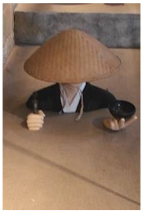 Adam Smith, the wunderkind studied in microeconomics, knew very well about the significant role that the Beggar plays in society by his signature study of the "Invisible Hand".
Adam Smith, the wunderkind studied in microeconomics, knew very well about the significant role that the Beggar plays in society by his signature study of the "Invisible Hand". Beggars are by nature invisible until they need to come into the public square to search for sustenance. All of a sudden, in a churning milieu alive with friction born of the heat of economic productivity, an empty "hand" intrudes into the usual rhythmic flow. Like a stone dropping into a body of water, the Beggar's presence may or may not send ripples or divert the flow, whether s/he is standing on a traffic island facing the stopped flow or on a subway platform singing operatic ditties well in tune with a boom box.
Beggars are by nature invisible until they need to come into the public square to search for sustenance. All of a sudden, in a churning milieu alive with friction born of the heat of economic productivity, an empty "hand" intrudes into the usual rhythmic flow. Like a stone dropping into a body of water, the Beggar's presence may or may not send ripples or divert the flow, whether s/he is standing on a traffic island facing the stopped flow or on a subway platform singing operatic ditties well in tune with a boom box. In a benign form, the Beggar has an air of lifelessness. We may not see her/him, or we do and then carry the burden of ignorance of something before our eyes. We know what s/he is doing: helping us to reconsider whether we have enough, just enough for one's lifestyle and what to do with the excess. If it's a perfect world, we find something of the latter and pass it on.
In a benign form, the Beggar has an air of lifelessness. We may not see her/him, or we do and then carry the burden of ignorance of something before our eyes. We know what s/he is doing: helping us to reconsider whether we have enough, just enough for one's lifestyle and what to do with the excess. If it's a perfect world, we find something of the latter and pass it on.But this is not a perfect world, as we learn in macroeconomics. Once regulation sets in, there are distortions to what is otherwise a perfectly natural hunter-gatherer environment. To wit, the Houston Chronicle provides a public service on how to obtain a Panhandler License.




